Glutamine vs Creatine: A Comparison of Their Benefits
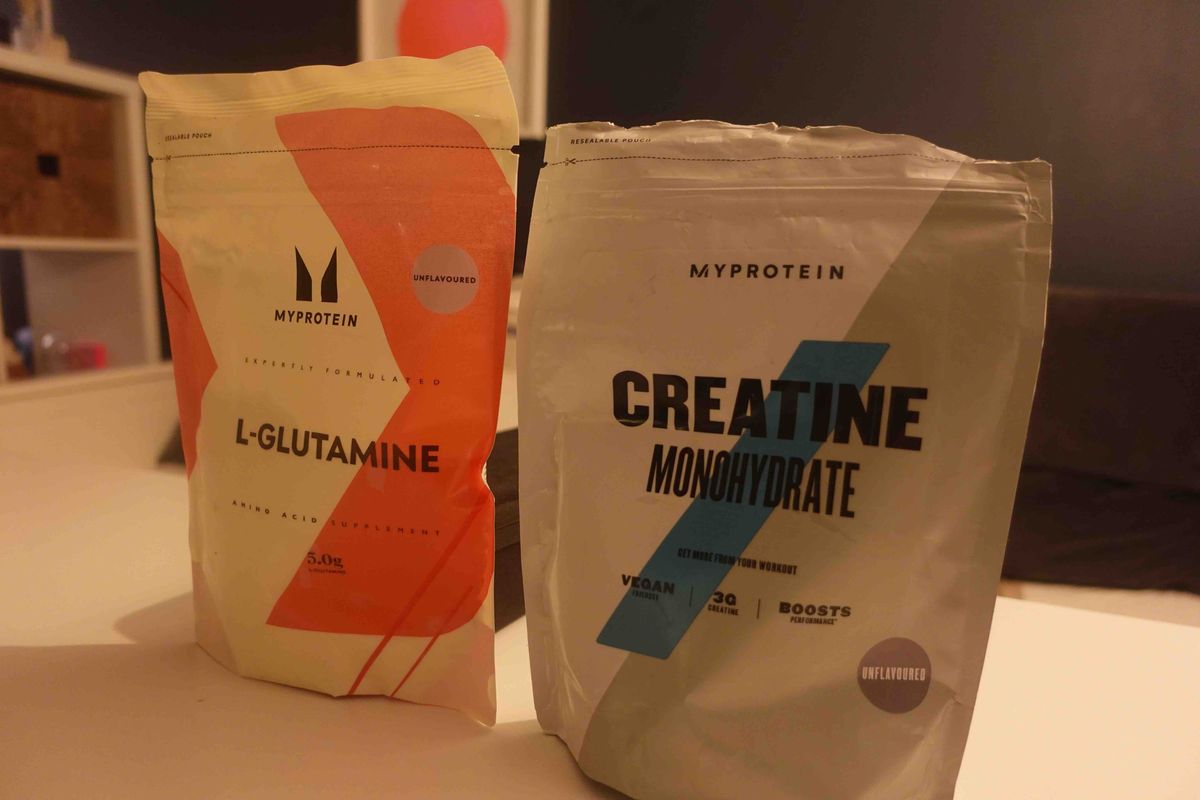
As someone who lifts most days and is training for ultramarathons, I'm interested in how the supplements I consume may affect my body and performance.
I've taken creatine monohydrate for years. It's cheap and probably has more scientific evidence supporting its safety and effectiveness than any other supplement. I keep notes about all of my workouts, and it's clear that my strength improves substantially when I take creatine supplements.
On the other hand, whether glutamine supplements are worth it is less clear.
When researching this article, the first study I found was a meta-analysis of 47 clinical trials that concluded that glutamine supplementation has no positive effect on the immune system, aerobic performance, or body composition (1)! Not a good start for glutamine! However, if 47 clinical trials were conducted, it must be for a reason, right?
Let's first define creatine and glutamine and then examine the evidence on whether they can support fitness goals such as muscle growth, strength and recovery, lean mass, and athletic performance.
What are Creatine and Glutamine?
Both creatine and glutamine are organic compounds with a range of different functions in the body. In the context of athletic performance, the main difference—described in more detail below—is that creatine increases energy sources in muscles, and glutamine appears to promote muscle protein synthesis. Therefore, creatine is best known for enhancing strength, while glutamine is usually linked to muscle growth and repair.
Creatine
Creatine is produced in the human body by the kidneys, liver, and pancreas (2), with 95% finding its way to skeletal muscles, where it helps to regenerate adenosine triphosphate (ATP). Specifically, a phosphorylated form of creatine (creatine phosphate) donates a phosphate group to adenosine diphosphate (ADP) so that it becomes ATP. As ATP is what the body uses as its primary energy currency, it makes sense that supplementing with creatine would increase the capacity of the muscles to work.
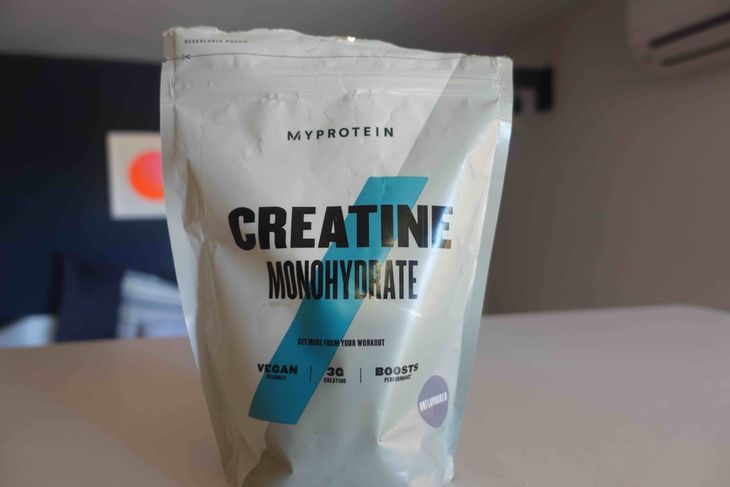
My current bag of creatine monohydrate from Myprotein. I take two small scoops (6g in total) per day.
Creatine supplementation often begins with a loading phase (e.g., 20 grams per day for 5–7 days), followed by a maintenance phase with a lower dose (e.g., 2–10 grams per day). This two-phase approach is designed to quickly saturate the muscles with creatine for immediate benefits and maintain those elevated levels over time with a reduced dosage.
Glutamine
Glutamine belongs to the non-essential amino acids, meaning the body can typically synthesise it. However, during periods of intense stress or injury, it becomes a conditionally essential amino acid, which means that the body's demand for glutamine exceeds its ability to produce it, and it needs to be obtained externally. The most abundant amino acid, glutamine, is thought to promote muscle protein synthesis, potentially enhancing muscle growth and reducing recovery time. Additionally, glutamine supplementation may promote glycogen synthesis, thereby supporting endurance.
Muscle Growth
Creatine
A study published in the Journal of Strength and Conditioning Research (3) investigated the impact of creatine supplementation on muscle gain, assessing its effect when administered at different frequencies (2 or 3 days per week) alongside resistance training in young adults. Participants who received creatine, dosed at either 0.15 grams per kilogram of body weight (e.g., 12.75g for an 85-kg person) during two days of resistance training per week or 0.10 grams per kilogram of body weight (e.g., 8.5g for an 85-kg person) during three days, showed a more significant increase in skeletal muscle tissue thickness compared to those taking a placebo.
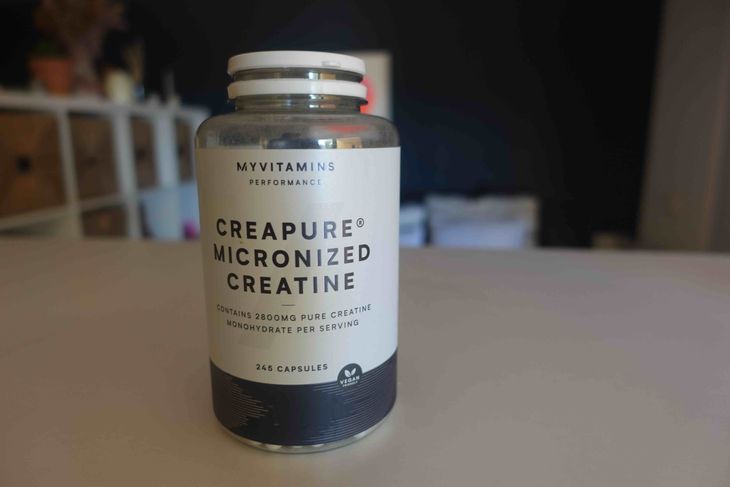
My creatine capsules from Myprotein. I usually take creatine as a powder when at home, though the capsules are less likely to make a mess in my bag when I'm on the road.
Creatine's ability to promote increases in muscle thickness is consistent with research indicating that creatine supplementation in combination with high-intensity exercise can promote cell proliferation (4).
Glutamine
In a study published in the Journal of Human Sport and Exercise (5), glutamine supplementation at a dose of 0.35g/kg/day (e.g., 29.75g for an 85-kg person), distributed across three daily intakes, was associated with a significant increase in body mass in the glutamine group (GL) compared to the placebo group (PL), with the GL group gaining an average of 2.3 kg. Both groups experienced small reductions in fat mass, but the increase in body mass in the glutamine group was notably higher, suggesting that glutamine may support muscle building and skeletal muscle tissue enhancement.
Such effects may reflect a role for glutamine in stimulating muscle protein synthesis (6)
Muscle Strength
Creatine
In research published by Nutrition Research (7), experienced powerlifters engaged in strength exercises such as leg extensions and deadlifts before and after a five-day regimen of either consuming 9 grams of creatine daily or a placebo. Those supplementing with creatine demonstrated notable improvements in muscle strength and power output, evidenced by increased peak torque in leg extensions and a higher maximum one-repetition deadlift compared to the placebo group. This underscores that even modest doses of creatine can lead to a significant improvement in muscular performance.
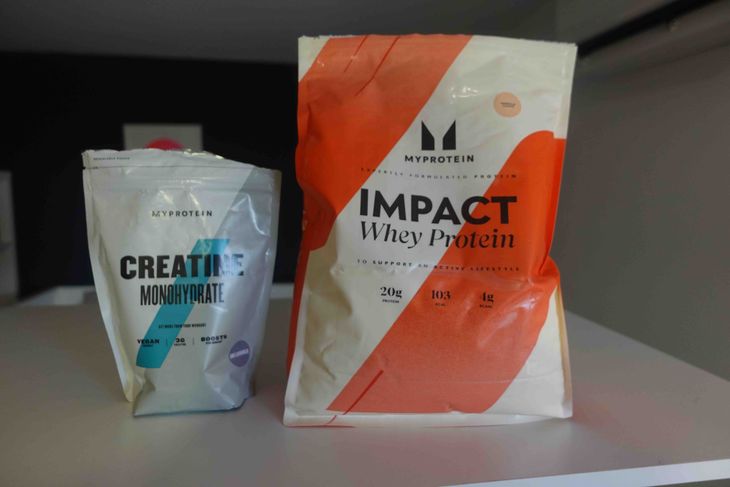
“Unflavoured” creatine (like most unflavoured supplements) actually tastes really bad, so I mix it with a flavoured whey protein concentrate.
Glutamine
The aforementioned study published in the Journal of Human Sport and Exercise (5) found that over an 8-week resistance training programme, male students taking glutamine supplementation (0.35g/kg/day; e.g., 29.75g for an 85-kg person) exhibited significantly greater increases in muscle strength compared to those in the placebo group. This suggests that strategic glutamine supplementation can enhance muscle performance and strength during resistance training.
Muscle Soreness
Creatine
A study published in Life Sciences (8) investigated the impact of creatine monohydrate supplementation on muscle soreness and injury markers among endurance runners. Thirty-four male athletes were administered 20 grams of creatine monohydrate or a placebo daily for five days leading up to a 30-km race. The findings indicated that those who took creatine experienced reduced markers of muscle damage, such as creatine kinase and lactate dehydrogenase, post-race, highlighting creatine's role in enhancing muscle recovery and reducing recovery time by potentially mitigating muscle damage.
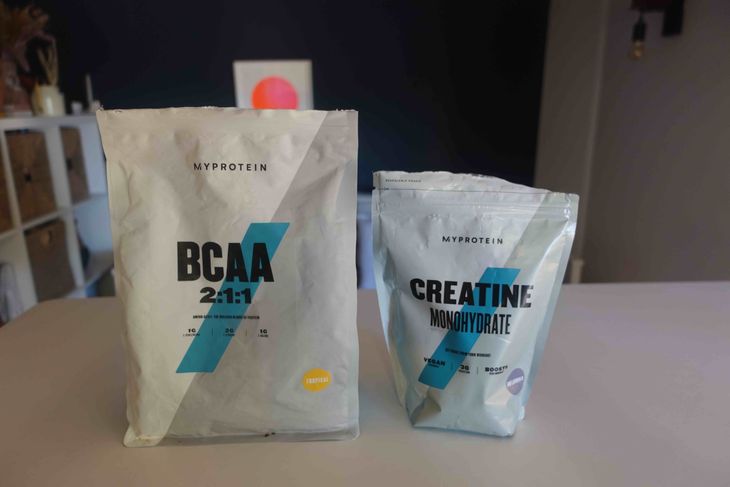
As well as creatine and whey protein, I take Myprotein's BCAAs virtually every day. BCAAs have been linked to loads of athletic enhancements (and they make water more interesting).
Glutamine
A study published in the Journal of Exercise Science & Fitness (9) explored the impact of glutamine supplementation on recovery after eccentric exercise, with 15 active males participating in a controlled trial where they consumed either a control mixture or one with 0.3 grams of glutamine per kilogram of body weight (e.g., 25.5g for an 85-kg person) post-exercise at various intervals. The results showed that glutamine supplementation significantly preserved knee-extensor concentric peak torque and reduced perceived muscle soreness compared to the control group without affecting creatine kinase levels. This suggests glutamine can mitigate strength loss and soreness following muscle-damaging exercise.
Lean Body Mass
Creatine
One study (10) explored the impact of low-dose creatine supplementation combined with resistance training on the lean body mass of elderly participants over 12 weeks, utilising a double-blind, placebo-controlled design. The results indicated that the group receiving creatine alongside resistance training experienced significant improvements in lean mass, underscoring the effectiveness of creatine in augmenting lean muscles in this demographic. This suggests that for older adults concerned with age-related muscle loss, incorporating creatine supplementation into their resistance training regimen could promote lean body mass.
Glutamine
In an investigation published in Nutrition (11), sixty-six patients with type 2 diabetes were randomly selected to receive either 30 grams per day of oral glutamine (10g powder, three times daily) or a placebo in a double-blind, placebo-controlled trial over six weeks. The results indicated a significant reduction in body fat mass and waist circumference and an increase in lean body mass without affecting overall body weight and BMI. These findings suggest that long-term glutamine supplementation could enhance body composition, particularly increasing lean body mass, and improving cardiovascular risk factors in patients with type 2 diabetes.
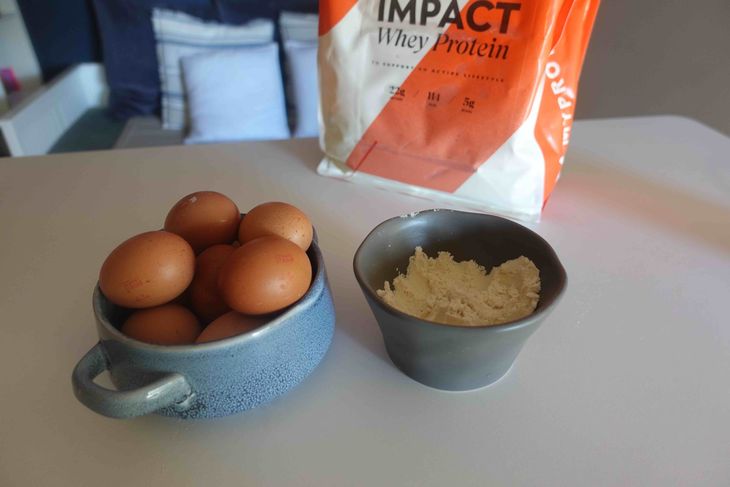
As discussed below, eggs and whey protein are both good sources of glutamine.
Energy Levels
Creatine
In a paper published in the International Journal of Sport Nutrition (12) with ten physically active, untrained, college-aged males, creatine supplementation (5g of creatine monohydrate mixed with 3g of dextrose) was administered four times per day for five days, using a double-blind, randomised, crossover design, to assess its effects on performance during isometric exercises. The results showed that creatine supplementation significantly enhanced maximal isometric strength in knee extension exercises and increased endurance across repeated submaximal efforts in knee extension and handgrip exercises, demonstrating an improvement in strength and fatigue resistance. These findings indicate that creatine boosts energy production and energy levels, including in exercises involving larger muscle groups,
Glutamine
In one study (13) assessing the impact of glutamine supplementation on fatigue among wildland firefighters, participants (5 males, 3 females) ingested glutamine at a dose of 0.15 grams per kilo of body weight per day or a placebo before and after engaging in two consecutive days of firefighting simulations within a heated chamber (35°C, 35% humidity). The results highlighted a significant reduction in subjective fatigue levels before exercise on the second day for those in the glutamine group. This suggests that glutamine supplementation could effectively mitigate fatigue and improve performance in strenuous environments.
Athletic performance
Creatine
Research published in the International Journal of Sport Nutrition and Exercise Metabolism (14) explored the impact of creatine supplementation on blood lactate levels in endurance cyclists. The investigation involved 13 male participants who undertook a maximal cycling test before and after consuming 20 grams of creatine daily for six days, finding that creatine notably decreased lactate concentrations during physical activity, hinting at an improved lactate threshold. This outcome suggests that for endurance athletes, particularly cyclists, creatine supplementation could lead to better performance by lowering lactate buildup and extending the duration of high-intensity efforts.
You can find out more in our article about the benefits of creatine for different athletes.
Glutamine
In a study involving 29 collegiate track and field athletes (15), participants were divided into three groups: one receiving creatine monohydrate (CM), one receiving both creatine monohydrate and glutamine (CG), and one receiving a placebo group. Over eight weeks, the athletes participated in a uniform strength and conditioning programme, with performance metrics assessed at the beginning and end of the supplementation period. The findings indicated that both the CM and CG groups, but not the placebo group, showed significant improvements in power production during cycle ergometer tests, highlighting the potential of creatine and glutamine supplementation to enhance athletic performance.
Other Benefits
The benefits of glutamine and creatine are not limited to things like muscle repair following high-intensity training; numerous studies provide evidence that they may also promote positive outcomes in relation to gut health, immunity, cognition, and neurodegeneration.
Gut Health
Research shows that glutamine may balance the good and bad bacteria in your gut and support its immune responses, which could help with health conditions like obesity and the after-effects of chemotherapy (16).
Immune Function
Glutamine is a crucial amino acid for the immune system, as it supports the growth and function of various immune cells (e.g., lymphocytes, macrophages, neutrophils) that fight off pathogens (17). There's also evidence that creatine could promote immune system health (18).
Cognitive Function
One systematic review of randomised controlled trials found that oral creatine supplementation can enhance short-term memory and intelligence/reasoning in healthy individuals (19). There's also evidence from rodent studies that glutamine supplementation may protect against the loss of cognition function associated with chronic stress (20).
Benefits for Those With Neurodegenerative Diseases
While creatine does not protect against Parkinson's disease (21), it does appear to be safe for those with the condition (22) and may help them minimise the loss of strength that patients often experience (23). Similarly, as glutamine metabolism is compromised in Alzheimer's disease, glutamine supplementation may help those with the condition to maintain critical cellular functions (e.g., mitochondria energy production; 24).
Side Effects
There isn't strong evidence of significant side effects associated with creatine supplementation when taken within recommended doses (25, 26), though it's common to experience water retention upon starting supplementation (27). While creatine itself is safe, a study by the University of Maryland Medical Center found that creatine supplements may contain contaminants. So, it's important to make sure that you buy from a reputable supplement company with rigorous quality controls.
Although short-term consumption of glutamine during strenuous exercise appears to be beneficial and safe, it has been speculated that long-term consumption of high quantities of glutamine may entail side effects (e.g., impaired liver function; 28). However, "high quantities" here are defined as 40 grams per day, whereas supplement companies like Myprotein generally recommend 5 grams daily.
Dietary Sources
Creatine
Creatine is present exclusively in animal-based foods, including fish and red meat, and in smaller quantities in dairy products (29, 30).
Table 1. Grams of Creatine per Kilogram of Different Foods
In the aforementioned creatine and strength study (7), participants ingested 9 grams of creatine daily. Although obtaining creatine from whole foods as part of a healthy diet offers additional micronutrients absent in supplements, achieving 9 grams would require consuming several kilograms of meat or fish! Conversely, this quantity can be effortlessly acquired through a few small scoops of creatine powder or a few creatine gummies or creatine capsules.
Glutamine
If you want extra glutamine in your diet, eggs, tofu, and certain animal proteins (e.g., beef) are particularly rich in glutamine (31).
Table 2. Grams of Glutamine per Kilogram of Different Foods
| Source | Grams per Kilo |
| Skimmed Milk | 2.75 |
| White Rice | 3.01 |
| Corn | 4.06 |
| Egg | 5.59 |
| Tofu (Soy) | 6.03 |
| Beef | 12.31 |
In the aforementioned study on glutamine and strength (5), participants consumed 0.35 grams of glutamine per kilo of body weight per day, which works out to about 30 grams for an 85-kilo person.
If you don't want to have to eat five kilos of tofu or two and a half kilos of beef to get enough glutamine, you could think about using a glutamine supplement to help get you there. With over 10 grams per 100 grams, whey protein powder is also a good source of glutamine (32), so you could also consider protein supplementation to help increase your glutamine intake.
Of course, as discussed in our article comparing eggs and whey protein, whey protein powders provide a wide range of different amino acids that have been linked to athletic outcomes.
Different Types of Creatine
The most popular and most studied type of creatine is creatine monohydrate. However, other forms, such as creatine ethyl ester, can also be found. One study published in the Journal of the International Society of Sports Nutrition found that creatine ethyl ester is not as effective as monohydrate for improving strength, power, muscle mass, or body composition (33).
Conclusion
We've seen that creatine plays a critical role in energy production. When combined with intense workouts, it appears to support muscle growth and strength and may promote muscle recovery following training sessions. Additionally, we've seen that the main benefits of glutamine supplementation may include increased powder, reduced fatigue, and improved lean body mass. However, some of the studies on glutamine are pretty small and, as mentioned at the start, one meta-analysis of studies involving amateur and professional athletes casts some doubt on whether increasing glutamine levels through supplementation positively affects body composition or aerobic performance.
Since you're interested in creatine and glutamine, you might also like our articles comparing creatine and whey protein and BCAAs and creatine. If you're interested in post-workout supplements, check out our article comparing glutamine and BCAAs in relation to recovery. If you're interested in other dietary supplements, we have articles on the most popular supplements for those looking to lose weight or gain weight, as well as the best sports supplements for diabetics and older individuals.
About the Author
Dave Robinson, a co-founder of ukfitness.pro, has a background in psychology (BSc) and neuroscience (MSc, PhD). As well as strength training, he enjoys endurance challenges and has run ultramarathons, cycled across several countries, and completed the Three Peaks Challenge. When writing, he draws on scientific evidence to understand the pros and cons of different diets, supplements, and training regimes.

References
1. Ramezani Ahmadi, A., Rayyani, E., Bahreini, M., & Mansoori, A. (2019). The effect of glutamine supplementation on athletic performance, body composition, and immune function: A systematic review and a meta-analysis of clinical trials. Clinical nutrition (Edinburgh, Scotland), 38(3), 1076–1091. https://doi.org/10.1016/j.clnu.2018.05.001
2. Bonilla, D. A., Kreider, R. B., Stout, J. R., Forero, D. A., Kerksick, C. M., Roberts, M. D., & Rawson, E. S. (2021). Metabolic Basis of Creatine in Health and Disease: A Bioinformatics-Assisted Review. Nutrients, 13(4), 1238. https://doi.org/10.3390/nu13041238
3. Candow, D. G., Chilibeck, P. D., Burke, D. G., Mueller, K. D., & Lewis, J. D. (2011). Effect of different frequencies of creatine supplementation on muscle size and strength in young adults. Journal of strength and conditioning research, 25(7), 1831–1838. https://doi.org/10.1519/JSC.0b013e3181e7419a
4. Olsen, S., Aagaard, P., Kadi, F., Tufekovic, G., Verney, J., Olesen, J. L., Suetta, C., & Kjaer, M. (2006). Creatine supplementation augments the increase in satellite cell and myonuclei number in human skeletal muscle induced by strength training. The Journal of physiology, 573(Pt 2), 525–534. https://doi.org/10.1113/jphysiol.2006.107359
5. Hakimi, M., Mohamadi, M. A., & Ghaderi, Z. (2012). The effects of glutamine supplementation on performance and hormonal responses in non-athlete male students during eight week resistance training. Journal of Human Sport and Exercise, 7(4), 770–782. https://doi.org/10.4100/jhse.2012.74.05
6. Jepson, M. M., Bates, P. C., Broadbent, P., Pell, J. M., & Millward, D. J. (1988). Relationship between glutamine concentration and protein synthesis in rat skeletal muscle. The American journal of physiology, 255(2 Pt 1), E166–E172. https://doi.org/10.1152/ajpendo.1988.255.2.E166
7. Rossouw, F., Krüger, P. E., & Rossouw, J. (2000). The effect of creatine monohydrate loading on maximal intermittent exercise and sport-specific strength in well trained power-lifters. Nutrition Research, 20(4), 505–514.
8. Santos, R. V. T., Bassit, R. A., Caperuto, E. C., & Costa Rosa, L. F. B. P. (2004). The effect of creatine supplementation upon inflammatory and muscle soreness markers after a 30km race. Life Sciences, 75(16), 1917-1924.
9. Street, B., Byrne, C., & Eston, R. (2011). Glutamine supplementation in recovery from eccentric exercise attenuates strength loss and muscle soreness. Journal of Exercise Science & Fitness, 9(2), 116-122. https://doi.org/10.1016/S1728-869X(12)60007-0
10. Pinto, C. L., Botelho, P. B., Carneiro, J. A., & Mota, J. F. (2016). Impact of creatine supplementation in combination with resistance training on lean mass in the elderly. Journal of cachexia, sarcopenia and muscle, 7(4), 413–421. https://doi.org/10.1002/jcsm.12094
11. Mansour, A., Mohajeri-Tehrani, M. R., Qorbani, M., Heshmat, R., Larijani, B., & Hosseini, S. (2015). Effect of glutamine supplementation on cardiovascular risk factors in patients with type 2 diabetes. Nutrition (Burbank, Los Angeles County, Calif.), 31(1), 119–126. https://doi.org/10.1016/j.nut.2014.05.014
12. Urbanski, R. L., Vincent, W. J., & Yaspelkis, B. B., 3rd (1999). Creatine supplementation differentially affects maximal isometric strength and time to fatigue in large and small muscle groups. International journal of sport nutrition, 9(2), 136–145. https://doi.org/10.1123/ijsn.9.2.136
13. Moore M, Moriarty TA, Connolly G, Mermier C, Amorim F, Miller K, Zuhl M. Oral Glutamine Supplement Reduces Subjective Fatigue Ratings during Repeated Bouts of Firefighting Simulations. Safety. 2019; 5(2):38. https://doi.org/10.3390/safety5020038
14. Oliver, J. M., Joubert, D. P., Martin, S. E., & Crouse, S. F. (2013). Oral creatine supplementation's decrease of blood lactate during exhaustive, incremental cycling. International Journal of Sport Nutrition and Exercise Metabolism, 23(3), 252–258.
15. Lehmkuhl, M., Malone, M., Justice, B., Trone, G., Pistilli, E., Vinci, D., Haff, E. E., Kilgore, J. L., & Haff, G. G. (2003). The effects of 8 weeks of creatine monohydrate and glutamine supplementation on body composition and performance measures. Journal of strength and conditioning research, 17(3), 425–438. https://doi.org/10.1519/1533-4287(2003)017<0425:teowoc>2.0.co;2
16. Perna, S., Alalwan, T. A., Alaali, Z., Alnashaba, T., Gasparri, C., Infantino, V., Hammad, L., Riva, A., Petrangolini, G., Allegrini, P., & Rondanelli, M. (2019). The Role of Glutamine in the Complex Interaction between Gut Microbiota and Health: A Narrative Review. International journal of molecular sciences, 20(20), 5232. https://doi.org/10.3390/ijms20205232
17. Cruzat, V., Macedo Rogero, M., Noel Keane, K., Curi, R., & Newsholme, P. (2018). Glutamine: Metabolism and Immune Function, Supplementation and Clinical Translation. Nutrients, 10(11), 1564. https://doi.org/10.3390/nu10111564
18. Bredahl, E. C., Eckerson, J. M., Tracy, S. M., McDonald, T. L., & Drescher, K. M. (2021). The Role of Creatine in the Development and Activation of Immune Responses. Nutrients, 13(3), 751. https://doi.org/10.3390/nu13030751
19. Avgerinos, K. I., Spyrou, N., Bougioukas, K. I., & Kapogiannis, D. (2018). Effects of creatine supplementation on cognitive function of healthy individuals: A systematic review of randomized controlled trials. Experimental gerontology, 108, 166–173. https://doi.org/10.1016/j.exger.2018.04.013
20. Baek, J. H., Jung, S., Son, H., Kang, J. S., & Kim, H. J. (2020). Glutamine Supplementation Prevents Chronic Stress-Induced Mild Cognitive Impairment. Nutrients, 12(4), 910. https://doi.org/10.3390/nu12040910
21. Attia, Ahmed, H., Gadelkarim, M., Morsi, M., Awad, K., Elnenny, M., Ghanem, E., El-Jaafary, S., & Negida, A. (2017). Meta-Analysis of Creatine for Neuroprotection Against Parkinson's Disease. CNS & neurological disorders drug targets, 16(2), 169–175. https://doi.org/10.2174/1871527315666161104161855
22. Bender, A., Samtleben, W., Elstner, M., & Klopstock, T. (2008). Long-term creatine supplementation is safe in aged patients with Parkinson disease. Nutrition research (New York, N.Y.), 28(3), 172–178. https://doi.org/10.1016/j.nutres.2008.01.001
23. Hass, C. J., Collins, M. A., & Juncos, J. L. (2007). Resistance training with creatine monohydrate improves upper-body strength in patients with Parkinson disease: a randomized trial. Neurorehabilitation and neural repair, 21(2), 107–115. https://doi.org/10.1177/1545968306293449
24. Chen, J., & Herrup, K. (2015). Glutamine as a potential neuroprotectant in Alzheimer’s disease. In Diet and Nutrition in Dementia and Cognitive Decline (pp. 761-771). https://doi.org/10.1016/B978-0-12-407824-6.00070-7
25. Buford, T. W., Kreider, R. B., Stout, J. R., Greenwood, M., Campbell, B., Spano, M., Ziegenfuss, T., Lopez, H., Landis, J., & Antonio, J. (2007). International Society of Sports Nutrition position stand: creatine supplementation and exercise. Journal of the International Society of Sports Nutrition, 4, 6. https://doi.org/10.1186/1550-2783-4-6
26. Kim, H. J., Kim, C. K., Carpentier, A., & Poortmans, J. R. (2011). Studies on the safety of creatine supplementation. Amino acids, 40(5), 1409–1418. https://doi.org/10.1007/s00726-011-0878-2
27. Hall, M., & Trojian, T. H. (2013). Creatine supplementation. Current Sports Medicine Reports, 12(4), 240-244. https://doi.org/10.1249/JSR.0b013e31829cdff2
28. Holecek M. (2013). Side effects of long-term glutamine supplementation. JPEN. Journal of parenteral and enteral nutrition, 37(5), 607–616. https://doi.org/10.1177/0148607112460682
29. Brosnan, M.E., Brosnan, J.T. The role of dietary creatine. Amino Acids 48, 1785–1791 (2016). https://doi.org/10.1007/s00726-016-2188-1
30. Rasmussen, C.J. (2008). Nutritional Supplements for Endurance Athletes. In: Nutritional Supplements in Sports and Exercise. Humana Press. https://doi.org/10.1007/978-1-59745-231-1_11
31. Lenders, C. M., Liu, S., Wilmore, D. W., Sampson, L., Dougherty, L. W., Spiegelman, D., & Willett, W. C. (2009). Evaluation of a novel food composition database that includes glutamine and other amino acids derived from gene sequencing data. European journal of clinical nutrition, 63(12), 1433–1439. https://doi.org/10.1038/ejcn.2009.110
32. Fouillet, H., Juillet, B., Gaudichon, C., Mariotti, F., Tomé, D., & Bos, C. (2009). Absorption kinetics are a key factor regulating postprandial protein metabolism in response to qualitative and quantitative variations in protein intake. American journal of physiology. Regulatory, integrative and comparative physiology, 297(6), R1691–R1705. https://doi.org/10.1152/ajpregu.00281.2009
33. Spillane, M., Schoch, R., Cooke, M., Harvey, T., Greenwood, M., Kreider, R., & Willoughby, D. S. (2009). The effects of creatine ethyl ester supplementation combined with heavy resistance training on body composition, muscle performance, and serum and muscle creatine levels. Journal of the International Society of Sports Nutrition, 6, 6. https://doi.org/10.1186/1550-2783-6-6